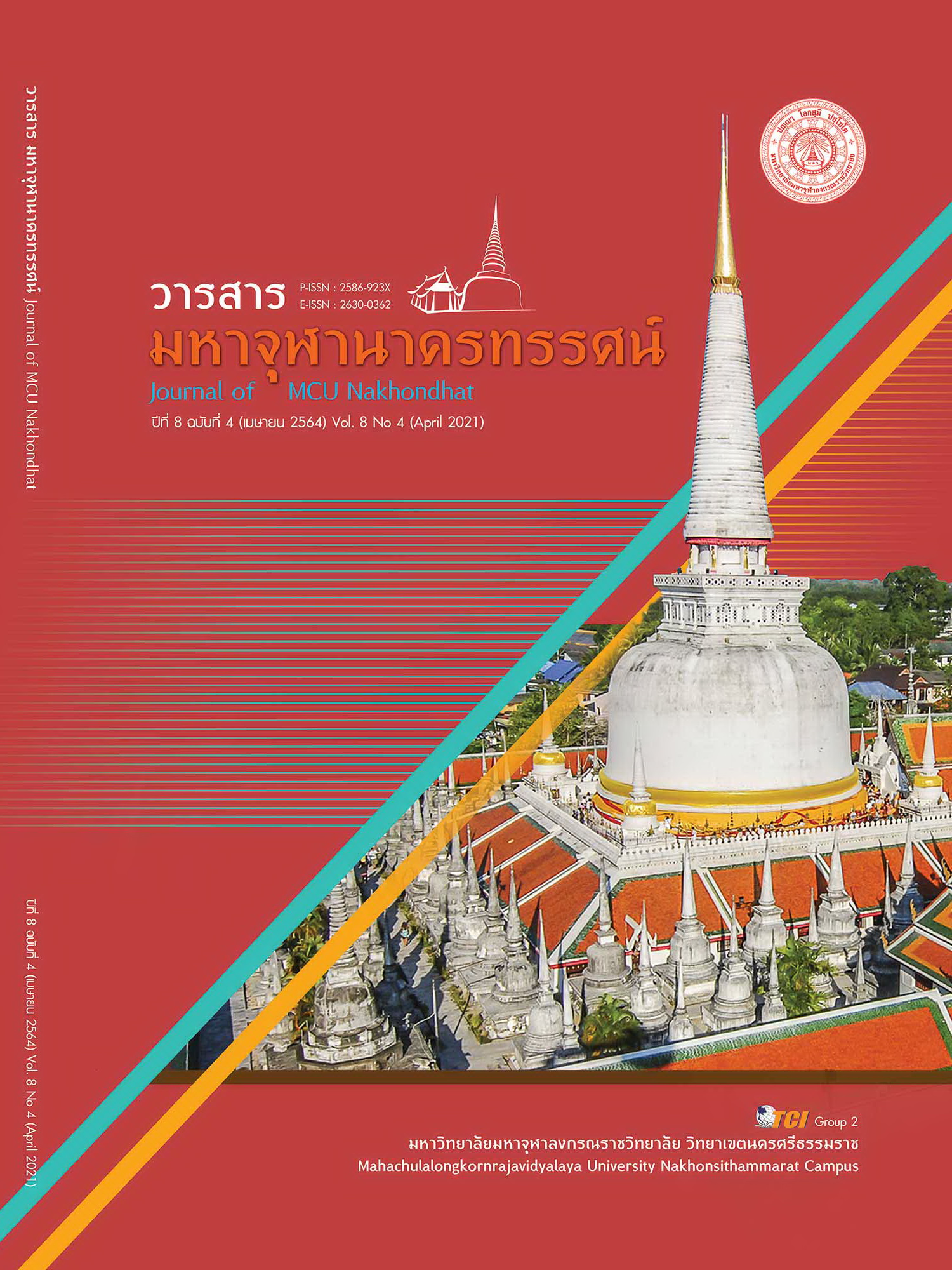ASSESSING STUDENTS’ THINKING SKILLS IN MATHEMATICS CLASSROOM USING LESSON STUDY AND OPEN APPROACH
Main Article Content
Abstract
The purpose of this research was to assess students’ thinking skills in mathematics classroom using Lesson Study incorporating Open Approach. The target group were 19 third - grade students in the academic year 2019 and 4 teachers of lesson study team in Loei province. The first stage was mathematics teaching and classroom observation using lesson study incorporating Open Approach. This stage had proceeded since the academic year 2017. The second stage was the research’s data collection from the 7 lesson plans entitled Vertical Multiplication. The research instruments which were used in this study were lesson plan’s form, lesson plans, a video recorder, a camera still recorder, a recorder audiotape, and an observer behavior’s form which analyzes data according to the concept of Inprasitha. The study results showed that the lesson study team had assessed students’ thinking skills as follows. In the collaborative teaching planning phase, the lesson study team discussed various issues, such as the lesson’s contents, lesson’s objectives, open–ended problems, students’ mathematical thinking hypothesis, an instrumental study assessment, and the topics to assess. The lesson study team predicted students’ mathematical thinking in various ways. For the collaborative observation of the teaching phase by using lesson study incorporating Open Approach, the lesson study team assessed students’ thinking skills by observing students' thinking while the students solved the problem and found out that they can think by themselves in various ways. And at the collaborative reflection of the teaching phase, the lesson study team reflected on students’ thinking which was found in the classroom. The mathematical thinking that the lesson study team predicted was in accord and found students’ problems in mathematics problem - solving. The previous teaching class’s reflection could help develop of mathematical teaching’s plans in the next mathematics teaching class.
Article Details
References
. (2560). วิธีการสอนที่เน้นกระบวนการแก้ปัญหาในบริบทของการพัฒนาวิชาชีพครูคณิตศาสตร์โดยใช้การศึกษาชั้นเรียนและวิธีการแบบเปิด. ใน เอกสารประกอบการอบรมเชิงปฏิบัติการสำหรับบุคลากรทางการศึกษาในโครงการพัฒนาการคิดขั้นสูงทางคณิตศาสตร์ของนักเรียนในเขตพื้นที่ภาคตะวันออกเฉียงเหนือ. โรงพิมพ์แอนนาออฟเซต.
. (2561). คณิตศาสตร์สำหรับระดับประถมศึกษา ชั้นประถมศึกษาปีที่ 3 เล่ม 1. ขอนแก่น: มหาวิทยาลัยขอนแก่น.
. (2561). นวัตกรรมการประเมินการเรียนรู้คณิตศาสตร์ในศตวรรษที่ 21. ใน เอกสารประกอบหลักสูตรเพื่อการพัฒนาครูและบุคลากรทางการศึกษา สายการสอนปี 2561. โรงพิมพ์แอนนาออฟเซต.
ศิริรัตน์ ชาวนา. (2555). การประเมินของครูเพื่อการเรียนรู้ของนักเรียนในชั้นเรียนที่ใช้วิธีการแบบเปิด. ใน วิทยานิพนธ์ศึกษาศาสตรมหาบัณฑิต สาขาวิชาคณิตศาสตรศึกษา. มหาวิทยาลัยขอนแก่น.
สดใส ศรีกุตา. (2557). การใช้การประเมินระหว่างสอนของครูเพื่อปรับการจัดการเรียนรู้ในชั้นเรียนที่ใช้การศึกษาชั้นเรียนและวิธีการแบบเปิด. ใน วิทยานิพนธ์ศึกษาศาสตรมหาบัณฑิต สาขาวิชาคณิตศาสตรศึกษา. มหาวิทยาลัยขอนแก่น.
สำนักงานเลขาธิการสภาการศึกษา. (2559). สภาวะการศึกษาไทย ปี 2557/2558 “จะปฏิรูปการศึกษาไทยให้ทันโลกในศตวรรษที่ 21 ได้อย่างไร”. กรุงเทพมหานคร: พิมพ์ดีการพิมพ์ จำกัด.
Grant P. W. (1993). Assessing Student Performance: Exploring the Purpose and Limits of Testing. San Francisco, California: Jossey - Bass.
Isoda, M. & Katagiri, S. (2012). Mathematical Thinking: How to Develop it in the Classroom. Japan: World Scientific.
John, B. & Geoff, T. (2013). Thinking Skills Critical Thinking and Problem Solving Second edition. Italy: L.E.G.O. S.p.A.
Lorna M. E. (2003). Assessment as learning: Using classroom assessment to maximize student learning. Thousand Oaks, California: Corwin.
. (2013). Assessment as learning: Using classroom assessment to maximize student learning – second edition. Thousand Oaks, California: Corwin.
The Partnership for 21st Century Learning. (2007). 21st Century Skills Assessment. Retrieved October 23, 2562, from https://snazlan.files.wordpress.com/2017/11/21st-century-skills_assessment.pdf
. (2015). P21 Framework Definitions. Retrieved October 23, 2562, from https://static.battelleforkids.org/documents/p21/P21_Framework_Definitions_New_Logo_2015_9pgs.pdf


